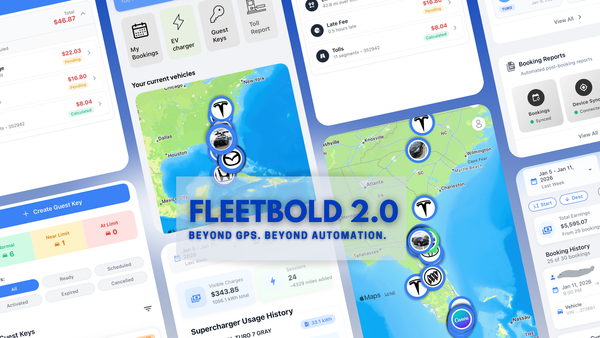FleetBold’s API vs. Tesla’s Official API: Which One is Right for Your Business
This blog compares Tesla's expensive API with FleetBold's cost-effective, feature-rich alternative for fleet management. Discover which solution suits your business needs.

Introduction: The Changing Landscape of Fleet Management APIs
In today’s rapidly evolving telematics industry, businesses that rely on fleet tracking and vehicle data are finding themselves faced with a crucial decision. Should they continue to use Tesla’s expensive official API or make the switch to FleetBold’s more affordable and feature-rich alternative? With Tesla’s recent update to their API pricing structure in January 2025, businesses are feeling the pressure of rising operational costs and looking for more efficient and budget-friendly options.
Tesla’s new API pricing model has caused many companies, including fleet operators, car rental businesses, and developers, to reconsider their reliance on Tesla’s API. Many are now seeking a more sustainable and cost-effective alternative that provides better real-time tracking, multi-vehicle support, and scalability. FleetBold’s API, with its lower costs and enhanced features, offers a compelling solution to these challenges.
In this blog, we’ll compare Tesla’s API with FleetBold’s API in-depth to help businesses make the best decision for their fleet management needs.
Tesla’s API: What’s Changed and Why Businesses Are Seeking Alternatives
Tesla’s official API has been the go-to solution for many businesses looking to manage their Tesla fleets and access vehicle data, location tracking, and remote control functionalities. However, with the recent update to Tesla’s API pricing, businesses are finding it increasingly difficult to justify the costs.
Tesla’s New API Pricing Breakdown
- Streaming Signals: $1 per 150,000 signals
- Commands: $1 per 1,000 commands
- Data Requests: $1 per 500 requests
- Vehicle Wake-ups: $1 per 50 wake-ups
The cost for businesses that require frequent API requests or use real-time tracking has now become significantly higher, making it difficult for many businesses to maintain profitability. For instance, fleet operators who have multiple vehicles may find the per-request and wake-up charges stacking up quickly, leading to escalating expenses.
Key Issues with Tesla’s API:
- High Costs: Businesses that rely on frequent API calls are now seeing their operational costs rise exponentially.
- Limited Real-Time Tracking: Tesla’s API has limited real-time tracking capabilities, which can be a major drawback for fleet operators who need live updates.
- Limited Vehicle Compatibility: Tesla’s API is restricted to Tesla vehicles only, leaving businesses with mixed fleets (Tesla and non-Tesla) struggling to manage all their vehicles under one system.
- Restrictions on Third-Party Integrations: Tesla’s API doesn’t support many third-party integrations, making it difficult for businesses to extend the API’s functionality beyond basic vehicle data access.
Given these issues, many businesses are now looking for a more flexible and cost-effective solution that doesn’t come with these limitations.
FleetBold’s API: A More Affordable & Feature-Rich Alternative
FleetBold has developed an API that directly addresses the challenges posed by Tesla’s official API. Offering a more affordable solution, FleetBold’s API not only provides real-time tracking but also supports multi-vehicle integration and is compatible with a variety of GPS devices.
FleetBold’s API Offers:
- Up to 300% Cost Savings: FleetBold’s API is up to three times more affordable than Tesla’s official API, significantly reducing operational costs.
- Real-Time Tracking on Live Maps: Unlike Tesla’s API, FleetBold’s API offers real-time vehicle tracking on live maps, even for Teslas that are in motion. This feature is essential for businesses that rely on accurate, real-time location data.
- Seamless Multi-Vehicle Integration: FleetBold’s API supports both Tesla vehicles and OEM vehicles, offering seamless integration across a variety of fleet types, including mixed fleets.
- Compatibility with OBD2 and GPS Devices: FleetBold’s API also supports other tracking systems, including OBD2, hardwired GPS, and telematics devices, making it ideal for fleet operators with diverse vehicle models and technologies.
FleetBold’s API is designed to meet the needs of businesses that require flexible, real-time tracking and want to save on costs without compromising on the features and reliability of their fleet management tools.
Tesla API vs. FleetBold API: Feature-by-Feature Comparison
Let’s take a closer look at how Tesla’s API and FleetBold’s API compare feature by feature:
| Feature | Tesla API | FleetBold API |
|---|---|---|
| Pricing | High, pay-per-use model | Up to 300% cheaper |
| Real-Time Tracking | Limited | Yes, live tracking |
| Multi-Vehicle Support | Tesla-only | Supports Tesla + OEM vehicles |
| GPS Compatibility | Tesla’s internal data only | OBD2, hardwired GPS, telematics systems |
| Wake-Up Charges | $1 per 50 wake-ups | No additional wake-up fees |
| Ideal For | Tesla-only fleets | Fleet operators, car rentals, mixed fleets |
Who Should Choose Tesla’s API?
Tesla’s API might still be a suitable choice for businesses that:
- Only manage Tesla vehicles and don’t need to track non-Tesla cars.
- Have low-volume API needs and can afford the new pricing model.
- Do not need real-time tracking and can work with the delays in data availability.
However, for businesses with higher tracking needs, real-time monitoring, or mixed fleets, Tesla’s API limitations may make it an impractical solution.
Who Should Choose FleetBold’s API?
FleetBold’s API is the best option for businesses that:
- Need real-time tracking for both Tesla and non-Tesla vehicles.
- Operate mixed fleets, with both Tesla and OEM vehicles.
- Run car rental businesses and require efficient vehicle tracking and automation.
- Want to reduce costs by up to 300% compared to Tesla’s API.
- Need GPS device compatibility, including OBD2 and hardwired GPS solutions.
By switching to FleetBold’s API, businesses can dramatically lower costs while maintaining flexibility and scalability for fleet management operations.
Conclusion: Which API Is the Best Fit for Your Business?
Tesla’s API has been a popular choice for managing Tesla vehicles, but with its new pricing structure and limitations, it’s no longer the most cost-effective solution for many businesses.
- FleetBold’s API offers a more affordable, scalable, and feature-rich solution with real-time tracking, multi-vehicle support, and compatibility with a wide range of GPS devices.
- For businesses that require Tesla and OEM vehicle tracking, FleetBold’s API provides a clear advantage, offering up to 300% cost savings and better overall flexibility.
If you’re managing a fleet or a car rental business and need to lower costs while improving fleet tracking capabilities, FleetBold’s API is the best choice for the future of your business.
Frequently Asked Questions (FAQ)
1. How does FleetBold’s API save businesses money compared to Tesla’s API? FleetBold’s API offers up to 300% cost savings by providing more affordable pricing, eliminating charges for wake-ups, and offering multi-vehicle support at a fraction of the cost.
2. What makes FleetBold’s API better than Tesla’s API? FleetBold’s API offers real-time tracking, support for mixed fleets, and compatibility with a range of GPS devices, all at a much lower cost than Tesla’s API.
3. Can FleetBold’s API track non-Tesla vehicles? Yes, FleetBold’s API supports both Tesla and OEM vehicles, making it a perfect solution for businesses with diverse fleets.
4. What other features does FleetBold’s API provide? FleetBold’s API provides live tracking, OBD2 and hardwired GPS device compatibility, and no additional wake-up charges, offering more comprehensive features than Tesla’s API.
5. How can FleetBold’s API benefit car rental businesses? FleetBold’s API allows real-time tracking, automation of vehicle management, and offers up to 300% savings on costs, making it ideal for car rental businesses looking to streamline their operations.





